Story of the Week... SkS in the News... Toon of the Week... Quote of the Week... Graphic of the Week... SkS Spotlights... Coming Soon on SkS... Poster of the Week... SkS Week in Review... 97 Hours of Consensus...
Story of the Week...
September 2017: Earth's 4th Warmest September on Record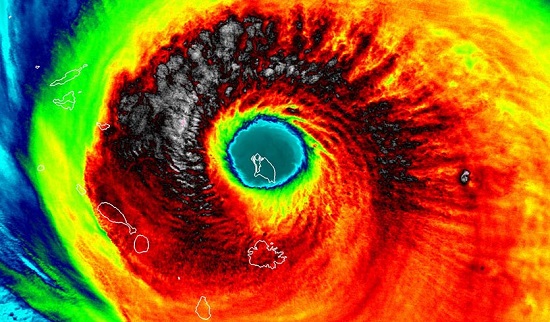
The deadliest weather-related disaster of September was Hurricane Irma, which killed 80 people in the Southeast U.S., and 44 people in the Caribbean and Bahamas. In this VIIRS infrared image of Hurricane Irma at 1:35 am EDT Wednesday, September 6, 2017, the island of Barbuda was in the eye, and Irma was a Category 5 storm with 185 mph winds. Image credit: UW-Madison/CIMSS.
September 2017 was the planet's fourth warmest September since record keeping began in 1880, said NOAA's National Centers for Environmental Information (NCEI) and NASA this week. The only warmer Septembers came during 2015, 2016, and 2014. Minor differences can occur between the NASA and NOAA rankings because of their different techniques for analyzing data-sparse regions such as the Arctic.Global ocean temperatures last month were the fourth warmest on record for any September, according to NOAA, and global land temperatures were the third warmest on record. Global satellite-measured temperatures for the lowest 8 km of the atmosphere were the warmest for any September in the 39-year record, according to the University of Alabama Huntsville (UAH) and Remote Sensing Systems (RSS).
September 2017: Earth's 4th Warmest September on Record by Jeff Masters, Weather Underground, Oct 18, 2017
SkS in the News...
Ari Jokimäki's series of original SkS articles about the infamous Florides et al. 2013 paper was highlighted in the Denier Roundup section of Climate Nexus' Hot News broadcast email of Friday, Oct 20. The Climate Nexus summary in its entirety:Plagarism’s Just One of Many Problems with Florides’ 2013 It’s-Sun-Not-Co2 Paper
With deniers running DC and creating political shenanigans, it’s been a minute since we focused on some shoddy denier science. So we were pleased to see a new series of posts at Skeptical Science detailing the many, many problems a group of researchers found with a 2013 paper by lead author Georgios Florides, and the long and winding road that led to the publication of this series all these years later.
The Florides paper in question concludes “no sound conclusions can be drawn” about climate change, because the “natural signal of solar forcing has been mistakenly overlooked for an anthropogenic change.” But is it accurate? Has the Sun’s influence been overlooked or confused for a human signal? In the spirit of not just assuming everything that contradicts the mainstream is bunk, let’s take a look.
In the first post in a four part series, Ari Jokimäki of Skeptical Science shows that the paper very obviously plagiarizes a lot of material: from IPCC AR4, from Wikipedia, other studies, and even the study author’s own book (which itself lifted language from elsewhere). Jokimäki and the SkS team focused on the 27 paragraphs of the first two chapters of the study, showing 78% contained portions of other texts not properly cited. Though there were some changes in some places, the edits “were trivial enough to suggest that there were deliberate copy-paste-editing involved.” When looking at the side-by-side comparisons, it is blatantly obvious Florides et al lifted others’ writings. (In one case, a word in the middle of a sentence is Capitalized, because that’s where the sentence started in the material they copy-pasted.)
In part two, Jokimäki goes into the content of the paper itself, detailing the many logical fallacies, misleading discussions, cherry-picking, omission of relevant research, misrepresentations and more that are standard for denial work. The Skeptical Science researchers found 43 individual problems in just the first two chapters of the paper. This means about 70% of the 27 paragraphs contained errors, averaging out to 1.6 problems per paragraph. Which, to Florides’ credit, makes it impressively wrong. For example, the paper reaches its conclusion that the Sun’s influence on climate has been overlooked by mainstream climate science by overlooking the mainstream science that deals with the Sun’s influence.
For the next act, the Skeptical Science folks put non-plagiarized sources cited by Florides under the microscope. Not surprisingly, 40% of the paper’s sources aren’t even peer-reviewed. A similar percentage of the paper’s references are to “contrarian” or “alternative” sources--i.e. other denier papers that we know are likely to suffer from the same failings as this one.
Finally, Jokimäki details in the fourth post the long and painful process of dealing with the journal that published this clearly awful paper. For three years now the SkS crew has been bringing these many damning problems to the otherwise solid journal, Renewable and Sustainable Energy Reviews and its popular publisher Elsevier. Despite the obvious plagiarism, which gets papers retracted all the time (and the journal essentially sidesteps by only comparing the study to one of the sources from which they copy and pasted, not all of them) and despite the overwhelming abundance of fallacies and errors, the journal refused to retract the paper. And despite an initial invitation from Elsevier’s editor-in-chief Lawrence Kazmerski to write a comment reply, after years of work and waiting for a response, Elsevier decided not to let Jokimäki et al publish their rebuttal.
Which is completely baffling. The errors are numerous, and plagiarism like this would get students at even the most lax school expelled! Why wouldn’t they retract such a fundamentally flawed paper? What the hEllsevier?
Toon of the Week...
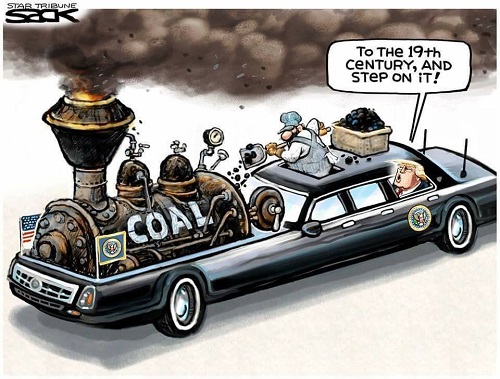
Quote of the Week...
“The fact that the number of flying insects is decreasing at such a high rate in such a large area is an alarming discovery,” said Hans de Kroon, at Radboud University in the Netherlands and who led the new research.“Insects make up about two-thirds of all life on Earth [but] there has been some kind of horrific decline,” said Prof Dave Goulson of Sussex University, UK, and part of the team behind the new study. “We appear to be making vast tracts of land inhospitable to most forms of life, and are currently on course for ecological Armageddon. If we lose the insects then everything is going to collapse.”
Warning of 'ecological Armageddon' after dramatic plunge in insect numbers by Damian Carrington, Guardian, Oct 18, 2017
Graphic of the Week...
2017 on Track to Be Third Hottest Year Nationally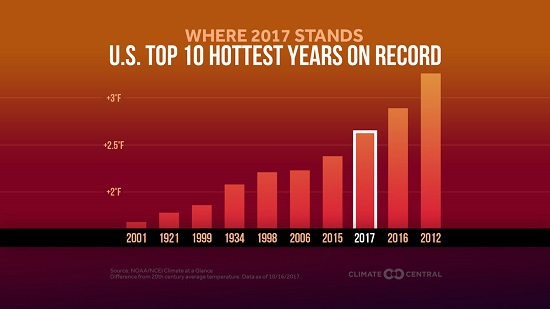
Download high resolution versions.
Through the end of September, 2017 is the third hottest year on record in the U.S. These figures are even more impressive in the absence of an El Niño, which gives a small boost in average global temperatures. This is further evidence that the observed long-term warming of the globe is from the buildup of greenhouse gases in the atmosphere.The U.S. will likely finish 2017 as the third hottest year since scientists began recording temperatures in the 1890s. If that holds true, then five of the 10 hottest years in the U.S. will have come since 2006. Only two of those 10 hottest years came before 1998, so those five hottest years are each hotter than the hottest of the Dustbowl years, 1934.
Through the end of September, the U.S. is having its warmest consecutive 24, 36, and 48 months on record. This consistent warmth over the past four years has been practically independent of the warming waters of an El Niño. In fact, La Niña years are now warmer than El Niño years from 30 years ago.
Speaking of oceans, they play a critical role in the earth’s longer term temperature, as 93 percent of the energy from human-caused warming is going into the oceans. This means that in addition to more warm days the planet is experiencing a more intense water cycle, which is behind the observed global increase in heavy precipitation.
METHODOLOGY: The top 10 years in the U.S. are NOAA calculations using anomalies based on the 20th-century average; 2017 is based on the year-to-date anomaly through September.
2017 on Track to Be Third Hottest Year Nationally, Climate Central Staff, Oct 18, 2017
SkS Spotlights...

The Global Environment Facility (GEF) was established on the eve of the 1992 Rio Earth Summit to help tackle our planet’s most pressing environmental problems. Since then, the GEF has provided over $17 billion in grants and mobilized an additional $88 billion in financing for more than 4000 projects in 170 countries. Today, the GEF is an international partnership of 183 countries, international institutions, civil society organizations and the private sector that addresses global environmental issues.
The GEF is…
- A UNIQUE PARTNERSHIP of 18 agencies — including United Nations agencies, multilateral development banks, national entities and international NGOs — working with 183 countries to address the world’s most challenging environmental issues. The GEF has a large network of civil society organizations, works closely with the private sector around the world, and receives continuous inputs from an independent evaluation office and a world-class scientific panel.
- A FINANCIAL MECHANISM for 5 major international environmental conventions: the United Nations Framework Convention on Climate Change (UNFCCC), the United Nations Convention on Biological Diversity (UNCBD), the Stockholm Convention on Persistent Organic Pollutants (POPs), the United Nations Convention to Combat Desertification (UNCCD), and the Minamata Convention on Mercury.
- AN INNOVATOR AND CATALYST that supports multi-stakeholder alliances to preserve threatened ecosystems on land and in the oceans, build greener cities, boost food security and promote clean energy for a more prosperous, climate-resilient world; leveraging $5.2 in additional financing for every $1 invested. Read more +
Coming Soon on SkS...
- 2017 SkS Weekly Climate Change & Global Waming Digest (John Hartz)
- Americans want a carbon tax; but how to get one? (Dana)
- The F13 files, part 3 (Ari)
- Guest Post (John Abraham)
- Interpreting the Paris Agreement’s 1.5C temperature limit (Joeri Rogelj & Carl-Friedrich Schleussner)
- New research this week (Ari)
- 2017 SkS Weekly Climate Change & Global Warming News Roundup (John Hartz)
Poster of the Week...
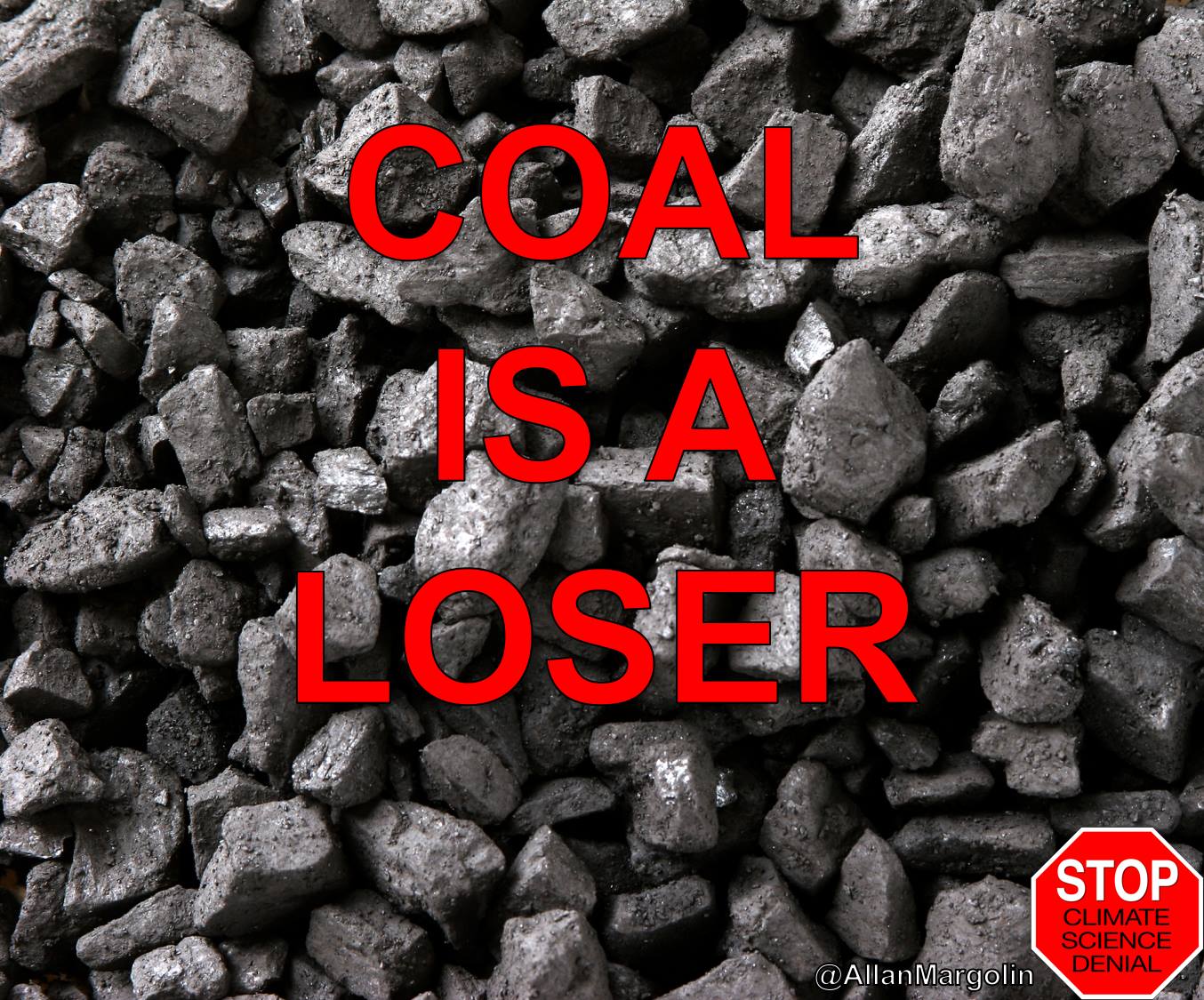
SkS Week in Review...
- 2017 SkS Weekly Climate Change & Global Warming News Roundup #42 by John Hartz
- New research, October 9-15, 2017 by Ari Jokimäki
- The F13 files, part 2 - the content analysis by Ari Jokimäki
- CliFi – A new way to talk about climate change by John Abraham (Climate Consensus - the 97%, Guardian)
- The F13 files, part 1 - the copy/paste job by Ari Jokimäki
- The war on coal is over. Coal lost. by Dana Nuccitelli, (Climate Consensus - the 97%, Guardian)
- 2017 SkS Weekly Climate Change & Global Warming Digest #41 by John Hartz
97 Hours of Consensus...
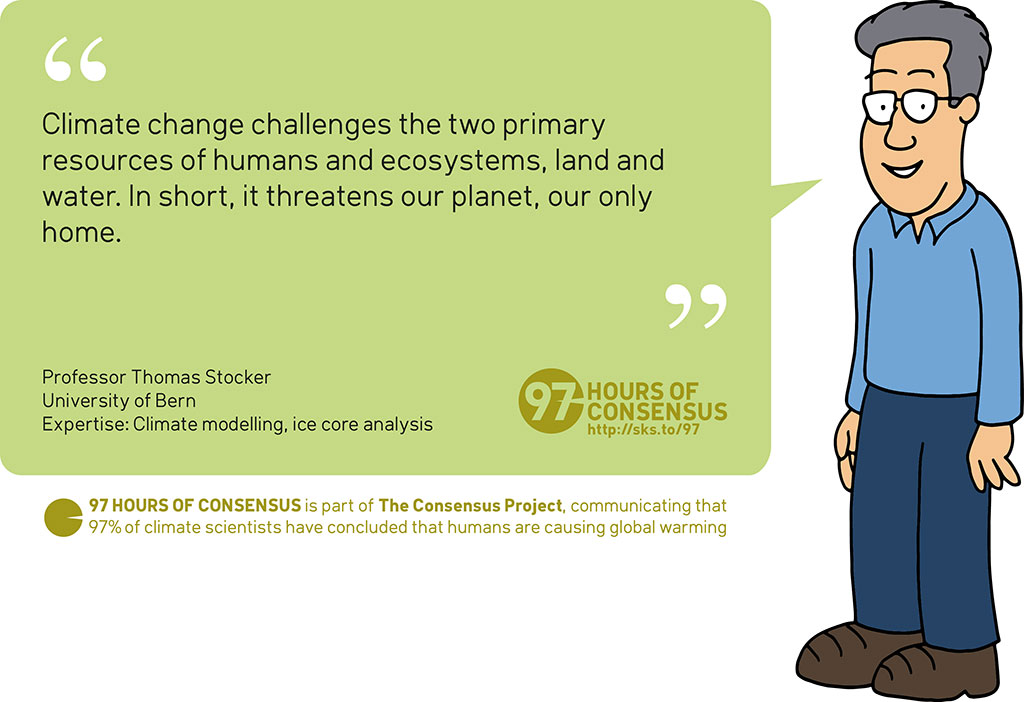
Thomas Stocker's bio page
Quote derived with author's permission from:
"[Climate change] challenges the two primary resources of humans and ecosystems, land and water. In short, it threatens our planet, our only home."High resolution JPEG (1024 pixels wide)
from Skeptical Science via IFTTT